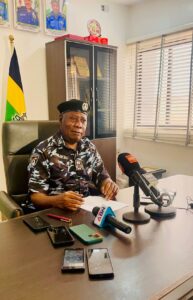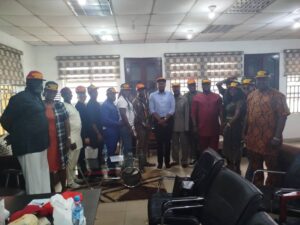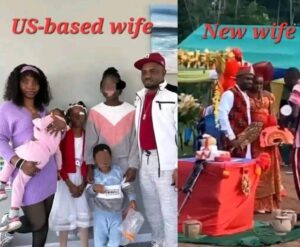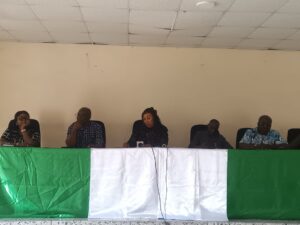IGBO LANGUAGE: TEACHING TONE MARKING IN OUR SENIOR PRIMARY SCHOOLS

By Paul Chika Emekwulu
In the early morning of December 16, 2022, I took a Keke to a Tracas motor park in my hometown to complete a waybill to my two sisters who live in Lagos. As soon as I got in the vehicle a conversation came up where we started to discuss some of the problems facing the Igbo Language. I saw this as a psychological moment to announce to the driver and his only passenger who was sitting on my right that I was writing a book about Keke and those who drive them. No details of the book were shared and I did that advertently. The only thing I said was that the book was to promote the teaching and learning of the Igbo Language. I told them also that the Igbo Language is in a pit, a pit dug by the very Igbo Language native speakers themselves. Therefore, whatever problems these speakers have got themselves into, it serves them right.
Continuing I said, “The Igbo Language is in distress, the Igbo Language is being insulted, the Igbo Language is being defaced.” I said for example every young boy or girl spells his or her Igbo name in English of course using English alphabets. Some adults are also into this habit. I always use “Ifeanyị” as an example.
From here the driver took over. He talked about people mixing Igbo with English in their everyday interactions (a practice widely known as “Engligbo”) To me, that is not a serious problem yet. It cuts across all social strata. “Engligbo” is less serious than some parents telling you sometimes proudly, that their children can’t speak the language but they can understand the language. Also “Engligbo” is less serious a problem than a parent or a guardian telling you that his or her child doesn’t speak Igbo because he or she was born in Abuja, that he or she was born in Lagos, that he or she was born in London, that he or she was born in America or simply that he or she was born overseas. The worst is that these are Igbo parents and guardians.
“By the year 2050 the Igbo Language will be extinct,” I continued.
“Who said that?” The driver asked.
“United Nations,” I responded.
The driver also lamented on how the Igbo Language native speakers treat the Igbo Language. He gave examples with those who work at the banks and the police. It was pointed out that of all Nigeria’s three main languages, the Igbo Language is the most neglected, of course by the owners of the language. I told them that private schools are the worst offenders by having weak Igbo Language curriculum or not at all. It is therefore not out of point to say that private schools are breeding grounds for Igbo Language haters.
I shared an experience I had with a mechanic in my neighborhood who I’ve come to know for sometime. He is one of those with ready smile. His surname is Ume but he spells it with an “h” at the end.
An Igbo proverb says that “an adult cannot be at home while a tethered goat dies in labour.” Because of that I had to do something.
“Why do you spell your surname with an “h”?
“Because of the white man,” he responded with his usual ready smile. That was when the driver cut in and asked, “How then do we differentiate between “Ume” which translates into “breath” and “Ume” (a person’s name)? Immedistely, I saw that as an interesting question. To the driver, in order to differentiate the first from the second, then the letter “h” has to be affixed to the second which is a person’s name. Of course such names as Eze, Ezemba, Mba, Ekemba, Ekwemba etc. are also spelt and written with an “h” at the end and that should not be so.
It doesn’t take a rocket scientist to notice that the driver supports the spelling with an “h”. I do believe there are many out there whose spelling of “Ume” as a name would not be different from that of the mechanic.
“How do we differentiate egbe (gun) from egbe (kite)?” I asked.
Immediately there was silence which was broken by the passenger on my right when he interjected the idea of tone marking (the use of marks to denote the rise and fall of vowel sounds). The situation has been saved. Tone marking applies to vowel sounds. As soon as he said that my mind went back to my Igbo Language class in high school. Not only that. I started thinking why tone marking should be a syllabus item only in secondary school. Why not start teaching tone marking right at senior primary school level? Doesn’t the word of God in Proverbs 22:6 teach us to direct children onto the right path and when they grow up they will not depart from it?
One other thing! Why is it that in both written and spoken English we obey all the rules of grammar but when it comes to Igbo Language we display a laissez faire attitude towards these things? The probable reason is because in spoken English when poorly expressed we face public ridicule and in written English we face the teacher’s red ink by being poorly graded.
In English language, the apostrophe(s) is very significant. For example, there is a very big difference between “passenger” and “passenger’s”, boy’s” and “boys” or boys’ etc. Without the apostrophe, there would be confusion and sense impression will be compromised.
As currently done, tone marking should not be introduced and taught only in secondary Igbo Language class but in senior primary school as well. Maybe the school is thinking that tone marking is a difficult concept for senior primary school children to understand. In my opinion the truth is that children will understand the concept of tone marking when taught and I have my reason.
Let us look at a math concept that was not directly a syllabus item but related to the syllabus when I was a primary school teacher many years sgo. First, let me bring it in and second, offer some explanations for those of us who are not familiar with the concept. I am talking about equivalent fractions.
By the way I taught myself equivalent fractions during an independent study in my second year of high school.
Now consider the following pairs of fractions:
1/2 and 5/10, 3/4 and 6/8, 6/7 and 12/14.
The above pairs of fractions are said to be equivalent. When two fractions are equivalent, they are the same. Why are the above fractions the same or equivalent?
Here is why?
When we say that for example, 1/2 and 5/10, 3/4 and 6/8 are equivalent what we mean is that 1/2 = 5/10 and 3/4 = 6/8. Similarly, 6/7=12/14.
It also means that for 1/2 = 5/10, 1×10 = 2×5.
Similarly for 3/4 = 6/8, 3×8 = 4×6 and for 6/7 = 12/14, 6 x14 = 7×12.
So, in a general sense, for two fractions a/b and c/d, if a/b = c/d, then b x c = a x d.
What more conclusions can be drawn about all this? There are more conclusions but they are beyond the scope of this article.
As said earlier when I was an elementary school teacher I exposed my pupils to the concept of equivalent fractions. They never complained. The majority of them understood the concept and were able to find x when giving a problem such as:
If 6/20 = x/12, what is x?
In secondary school mathematics, equivalent fractions were never taught as an individual syllabus item. Rather it was embedded in fractional simple equations e.g. If 2x/3 = 12, what is x?
Here is the solution of the above equation and how the knowledge of equivalent fractions is a part of the solution.
2x/3 = 12
Re-writing the above equation we have:
2x/3 = 12/1
Multiplying across we have:
(2x)(1) = (3)(12)
Dividing both sides of the equation by 2, the final result will be:
x = 18.
Out of love, I just realized how important and relevant the knowledge of equivalent fractions could be in the children’s future math education.
Now why this short lesson on equivalent fractions? Well, I am making a point for the teaching of tone marking in our senior primary schools.
Tone marking can be successfully introduced and taught at senior primary school level.
Initial approach could be in the form of a take home class assignment. In such assignments, as a set induction, the children could be asked to create a way to differentiate between words like “Ume” (person’s name) and breath (Ume). The results will then be shared and discussed in class until a concensus is reached.
“Are you on WhatsApp?” I asked the driver.
“No,” he responded.
I told them that I use WhatsApp as a platform in promoting the Igbo Language.
We all know that promoting the Igbo Language should not be only those on social media e.g. OTU SỤBAKWA IGBO. Rather, promoting the Igbo Language should be a concerted effort involving every Igbo Language native speaker, at home or abroad. It should never be a matter of geography.
In conclusion, tone marking should, as a matter of urgency be made an important syllabus item in the senior primary school Igbo Language curriculum of all the Igbo Language speaking states of Abịa, Anambra, Delta, Ebonyị, Enugu, Rivers, Bayelsa and anywhere Igbo Language is spoken including the diaspora.






